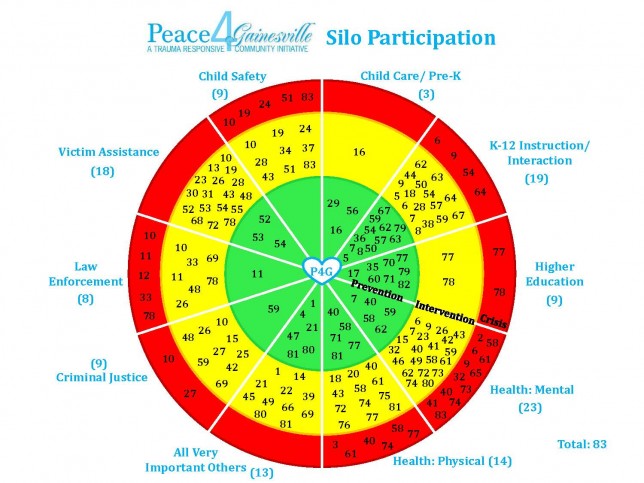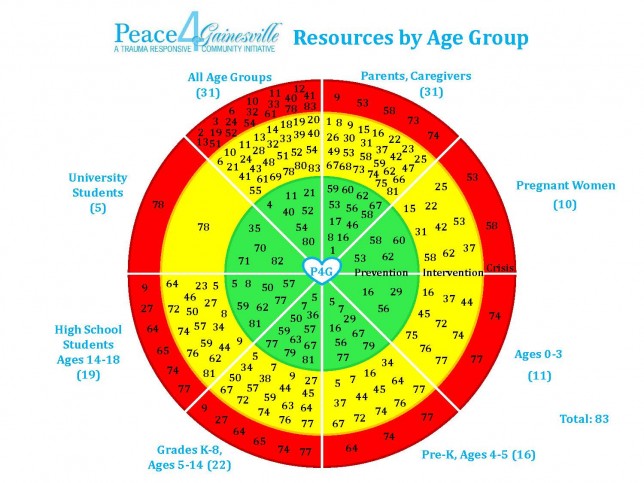Providing Trauma Responsive Care
What Is A Trauma Responsive Community?
|
A trauma responsive community is aware of the high prevalence of traumatic experiences found in its children and community. It values and supports prevention and healing through resiliency building.
A trauma responsive community works to prevent trauma by fostering safe, supportive and nurturing relationships. Because we cannot eliminate all of life’s traumas, a trauma responsive community works to enhance the coping mechanisms and stress reduction skills of all, and especially those already traumatized, so that they do not reach the crisis point. People in crisis can no longer manage their trauma and cannot prevent their traumatic and post traumatic experience from triggering harmful behavior towards others. Coping skills and resilience skills that are taught need to be developmentally appropriate and appropriate coping skills may change across the lifespan. A trauma responsive community works to reduce stigma associated with trauma. Many of those suffering from trauma need reassurance that trauma is not their fault and that they did not deserve the trauma they experienced. A trauma responsive community understands that traumatized individuals may react to situations which threaten their sense of safety with socially unacceptable behavior. Those who have been traumatized need assistance to restore their sense of safety and to be supported in their own recovery from trauma. The negative impact of trauma can become multigenerational when not identified and dealt with early. |
A trauma responsive community seeks to apply a basic understanding of trauma to service provision. Service providers are aware of the outward signs of trauma depending upon the stage of development along the life course, which varies with age, gender, social and marital status, sexual orientation and sexual identity.
A trauma responsive community is one in which all sectors have a basic understanding of toxic experiences and how they may impact the course of life. People traumatized by a life event may have altered brain development, impaired cognitive capacity, poor mental and physical health, plus they may have challenges with their relationships with other people. They can show signs of depression, anger, a profound sense of vulnerability, and loss of optimism. A trauma responsive community applies appropriate community resources to those who have been traumatized. Caregivers of traumatized individuals and perpetrators of trauma need supportive resources as well. A trauma responsive community acknowledges that perpetrators of trauma have often experienced prior trauma themselves. A trauma responsive community fosters collaboration among service providers for those traumatized as well as service providers for their caregivers. Because many traumatized individuals suffer from guilt or shame for needing help to deal with the traumatic experience, stigma may prevent some from seeking help as they deny the trauma or minimize it. |
A trauma responsive community is a safe place to talk about trauma and to get help.
Resource Map
In an effort to create a trauma responsive community, Peace4Gainesville members have created a community resource map. Please review the key to the map; if you do not see your organization on the map please contact us.
Resources for Providers
- Adverse Childhood Experiences (ACE) result in trauma, which leads to early death. In an effort to prevent trauma, we have provided an ACE survey. This can be used to determine if someone has experienced (or is currently experiencing) trauma: ACE survey
- Attending to Well-being in Child Welfare
- Trauma-Informed Care in Behavioral Health Services
- National Child Trauma Toolkit
- Recognizing When a Child’s Injury or Illness Is Caused by Abuse
- Strategies and Resources to Create a Trauma-Sensitive School
- Supporting Early Brain Development: What do Parents Need?
- Trauma Informed Child Welfare Practice Toolkit
- Resiliency trumps trauma! We have included a resiliency survey to determine the resiliency score: Resiliency Survey
- Stress is a leading cause of anxiety and can cause health disorders. Reducing stress can reduce symptoms of disease and lead to an overall well-being: Lovingkindness meditation, University of Massachusetts Center for Mindfulness
- Information and Inspiration for Parents of Challenging Children: Full Potential Parenting
- The National Child Traumatic Stress Network
- Trauma Informed Care: National Council for Behavioral Health
- The Multiagency Network for Students with Emotional/Behavioral Disabilities: Resources
- Helping Traumatized Children Learn: Trauma Sensitive Schools
- In Spanish: Handouts for parents about ACEs, toxic stress & resilience
- Applying Mindfulness to Mundane Classroom Tasks
- 22 Printable Mandala & Abstract Coloring Pages for Meditation & Stress Relief
- Department of Mental Health & Substance Abuse Services: Resources




